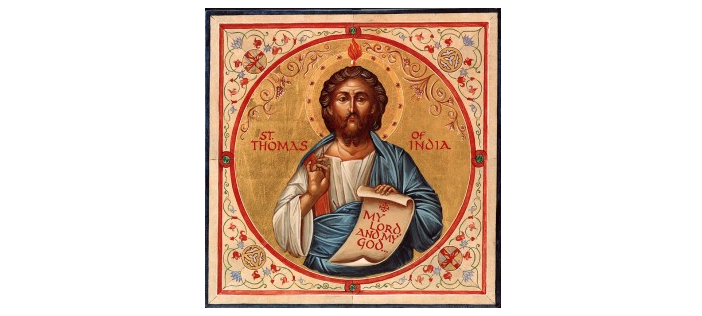July 3 - St: Thomas Day

A Blessed and Happy St. Thomas Day to all! St. Thomas Day is celebrated on July 3rd by the believers of Malankara Orthodox Church which was founded by St. Thomas the Apostle.
St. Thomas is also known as ‘Didymus’ which means ‘twin’ and also ‘Judea’. Thomas is the Aramaic translation of the Greek work Didymus. It was because two fingers on the hand of St. Thomas were joined that he received this name. Another tradition claims that it was because he was born as the twin brother of Adai. We do not have much historical records about the life and work of St. Thomas. It is in the Gospel according to St. John that we get a glimpse of the personality of St. Thomas.
After the resurrection of our Lord, St. Thomas evangelized around Palestine. After this he was sent to India. He arrived as the architect of the palace of King Gondaphorus. A merchant by the name of Abannis also accompanied St. Thomas. We see evidence for all this in the ancient document of Acts of Judas Thomas. Evidence is available in the present day which demonstrate that Gondaphorus was a historical figure. Coins bearing the name of this king has been found in Punjab during the 19th century. Scholars argue that Gondaphorus is the Parthian king who governed the territories of present day Afghanistan, Beluistan, and Punjab. If we accept this we would need to assume that St. Thomas did his mission work in the Northern parts of India. However the ancient Christian churches are not present there.
After St. Thomas laid the foundation for the church in Kerala, he traveled as far as Malacca, and China to spread the gospel. He returned to India and became a martyr at Mylapore. In spite of the lack of evidence, the presence of the historical church in Kerala gives credibility to this claim.
In St. John’s Gospel a serious place is given to St. Thomas. In the other gospels, with the exception to the lone mention among the list of the twelve apostles, St. Thomas is not mentioned.
We receive the picture of a brave apostle from the portrayal in St. John’s gospel. In the days following the resurrection of our Lord, when the other apostles hid themselves in the upper room, St. Thomas was brave enough to be outside.
In Greek drama there is a technique of introducing an insignificant character in order to introduce a twist in the plot and a message. St. Thomas holds such a place in the gospel of St. John. St. Thomas makes his bold presence felt thrice in the gospel of St. John. St. Thomas’ proclamation prior to the raising of Lazarus is notable. He encourages his fellow disciples and says boldly says, “Let us also go so that we may die with him” (St. John 11:16). The ultimate goal for all Christians is to die and resurrect with Christ. This courage is what the bold St. Thomas proclaims.
On another occasion a question posed by St. Thomas creates the setting for the Lord to reveal a great truth. To the question of St. Thomas that “How can we know the way?”, Jesus responds by his most famous proclamation, “I am the way, the truth, and the life (St. John 14:6). The foundational thought of Christianity is revealed in this statement.
Thirdly St. Thomas’ proclamation of faith stands as the ground for all confessions of faith. When St. Thomas confesses Jesus as “My Lord and my God” (St. John 20:28) he stands as the representative of all believers. While the disciples were content with seeing the risen Lord, St. Thomas publicly expressed the desire to touch the risen Christ.
Orthodox Christians living outside India can be proud that they are the heirs of the great St. Thomas Tradition. The bright light of the gospel has begun to dim in the Western world. The immigrant community living outside Kerala must take up the torch handed to them by the great Apostle St. Thomas. This community has to act as a beacon of hope in the Western world just as St. Thomas courageously served with his life two thousand years ago.
May the intercession of St. Thomas guide us all
Subscribe to Kadammanittapally
Get the latest posts delivered right to your inbox